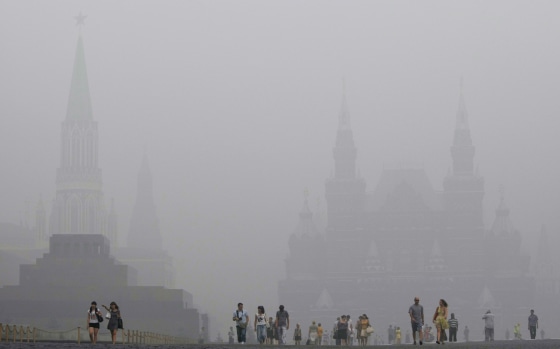Recent summer heat waves unprecedented, study says

The summer heat waves over the past decade that killed thousands of people in Europe, scorched the Russian wheat crop, and sent Greenland's glaciers galloping to the sea are without parallel since at least 1400, according to a new study.
The findings are based on a statistical analysis of summer seasonal temperatures inferred from tree rings, ice cores, lake sediments, and instrumental records. They are largely consistent with other global temperature reconstructions, but put a finer point on the unusualness of the recent warmth.
Read: Warming fastest since dawn of civilization, study shows
"Temperatures are without precedent warmer than what we're seeing over at least a 600-year time span," Martin Tingley, a climate scientist at Harvard University in Cambridge, Mass., told NBC News.
He and colleague Peter Huybers approached the question of just how extremely warm recent years are using a type of statistical analysis that allowed them to simultaneously compare one year to many years so that they can determine with high confidence whether one year was indeed warmer than all others.
They do this by using the multiple proxies — the ice cores, lake sediments, etc. — to come up with thousands of potential estimates of past climate. This frees the researchers from relying on a single best guess of past climate with a large degree of uncertainty.
"Instead of saying men in the U.S. are on average 5 feet 11 inches with some uncertainty, we get a random sample of 1,000 people and use that to build up our statistics," Tingley explained.
The approach allowed Tingley and Huybers to conclude in a paper in Thursday's issue of the journal Nature that with a 95 percent probability the high northern latitude summers of 2005, 2007, 2010 and 2011 "were warmer than all prior years back to 1400."
In addition, the pair adds that, with a 99 percent probability, "the summer of 2010 was the warmest in the previous 600 years in western Russia and (with a 90 percent probability) the warmest in western Greenland and the Canadian Arctic as well."
See slide show: Fires rage across Russia
While the findings are generally consistent with previous work, the new paper puts these extreme warm years in a spatial and temporal context, noted Shaun Marcott, a climate scientist at Oregon State University, who was not involved with the new work.
"In other words, they have provided a spatial fingerprint of where the events were extreme and to what level they were extreme over the past 600 years," he told NBC News in an email.
The cause of this unprecedented warmth, Tingley and Huybers found, is due a rise in mean global temperature, not an increase in variability. In other words, the weather is as variable as ever, but that variability now bounces around a warmer mean temperature so that temperature spikes are off the charts.
This point is important, noted Marcott, since other researchers have "argued that the frequency of warm events in the last decade occurred because of increased temperature variability. But this work here would indicate that the mean climate temperature has changed, thus explaining these more frequent extreme events."
John Roach is a contributing writer for NBC News. To learn more about him, visit his website.